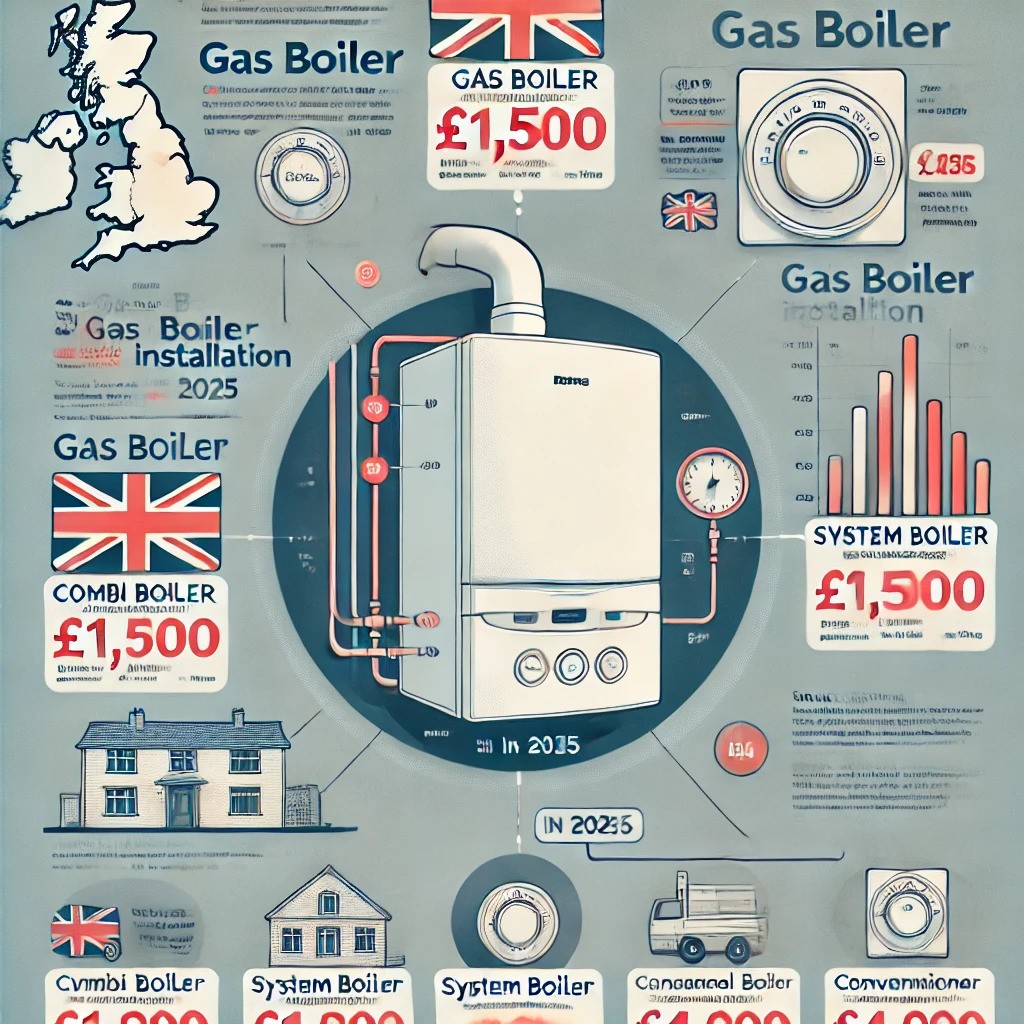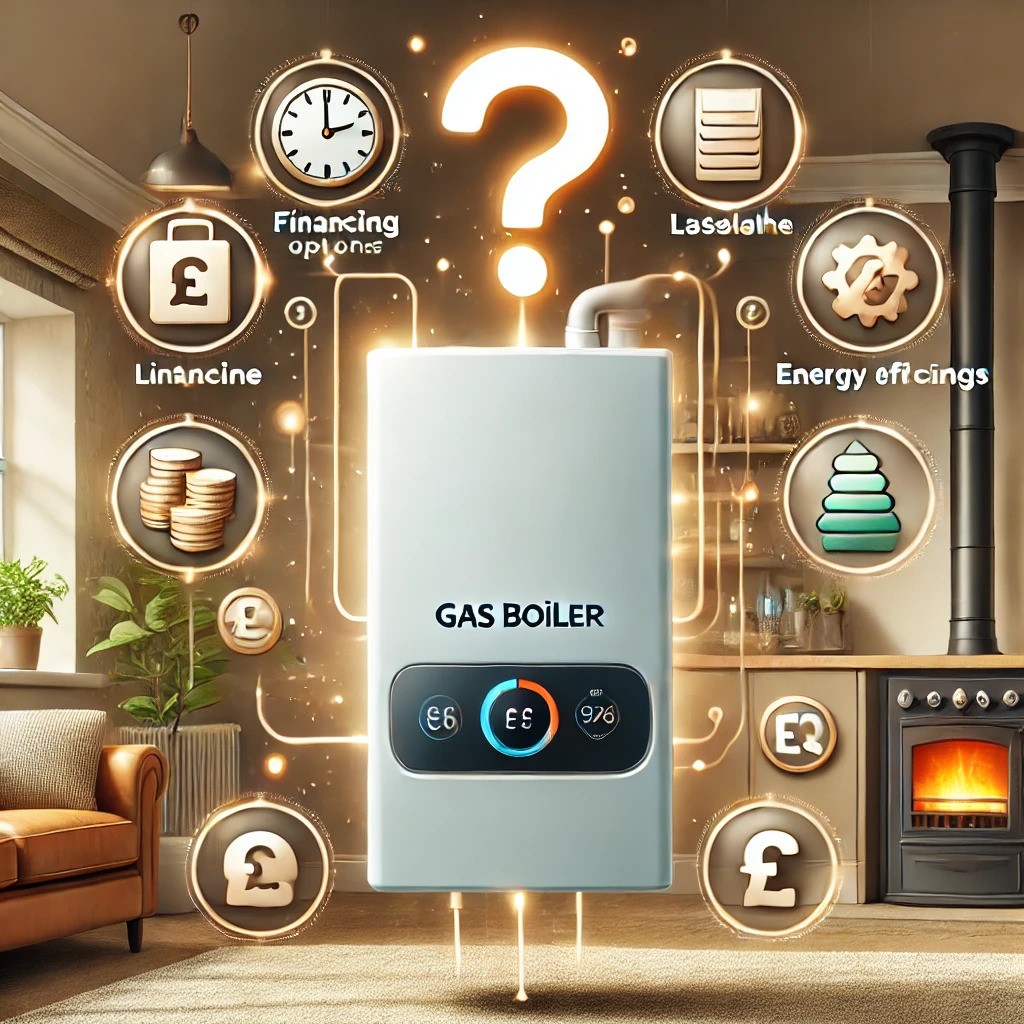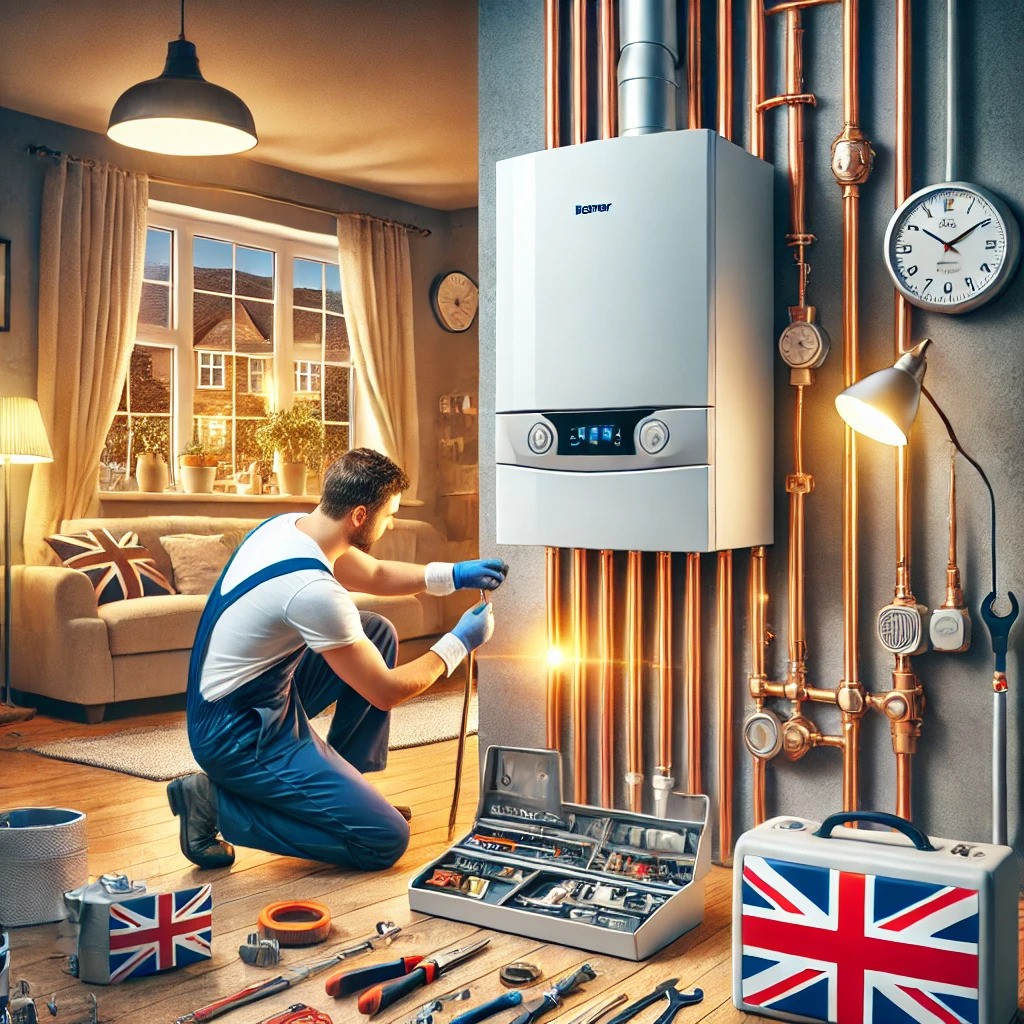Gas boilers are one of the most common ways people in the UK heat their homes. They are reliable, energy-efficient, and provide both heating and hot water on demand. With energy prices constantly changing and a focus on reducing carbon footprints, many homeowners are looking to upgrade their heating systems in 2025.
If you’re thinking about installing a new gas boiler, understanding the costs involved is essential. Installation costs can vary greatly depending on the type of boiler you choose, the size of your home, and the complexity of the installation process. Knowing what to expect can help you budget effectively and avoid any unexpected expenses.
This guide will help you understand the key factors that affect the cost of gas boiler installation in the UK. We’ll discuss average costs, extra expenses to watch out for, and ways to save money while still ensuring a high-quality installation. Whether you’re replacing an old boiler or installing one for the first time, having this knowledge will make the process smoother and more affordable.
For more information on choosing the right boiler, you can check out the Energy Saving Trust’s guide to boilers and the Gas Safe Register to ensure your installer is certified and trustworthy.
By the end of this guide, you’ll have a clear idea of what to expect in terms of costs and steps to take, ensuring you get the best value for your money in 2025.

Why Consider a New Gas Boiler in 2025?
Upgrading to a new gas boiler in 2025 can bring many benefits for your home. Boilers are an essential part of keeping your house warm and comfortable, and newer models are much more efficient than older ones. If your current boiler is over 10 years old, it’s likely costing you more money on energy bills than it should.
One of the biggest advantages of installing a new gas boiler is energy efficiency. Modern boilers are designed to use less gas while providing the same amount of heat, which can lower your energy bills significantly. In fact, upgrading to a high-efficiency boiler can save you hundreds of pounds each year, especially with rising energy costs.
Another reason to consider upgrading is the improvement in heating quality. New boilers heat your home faster and more evenly, making it more comfortable during the colder months. They also come with advanced controls and smart thermostat options, allowing you to manage your heating more easily and save even more energy.
Installing a new boiler can also help you reduce your carbon footprint. Modern gas boilers emit less carbon dioxide, which is better for the environment. If you’re considering a greener heating solution, combining a new gas boiler with renewable energy sources like solar panels can be a great step.
To learn more about the benefits of energy-efficient boilers and how to reduce your carbon footprint, visit the Energy Saving Trust website.
Upgrading your gas boiler in 2025 is not just about saving money—it’s about improving your home’s comfort and doing your part to protect the environment.
Factors That Influence Gas Boiler Installation Costs
The cost of installing a new gas boiler can vary depending on several key factors. Understanding these will help you plan your budget and avoid surprises.
Type of Boiler
There are three main types of boilers: combi, system, and conventional.
- Combi boilers are compact and provide heating and hot water directly from the boiler. They are usually cheaper to install since they don’t need extra tanks.
- System boilers require a hot water storage tank but no cold water tank. They are ideal for larger homes with higher hot water needs.
- Conventional boilers need both a hot and cold water tank, making them the most expensive to install due to the additional components required.
Boiler Size and Power
The size and power of your boiler depend on your home’s heating and hot water needs. For a small flat, a smaller boiler will suffice, while a large house with multiple bathrooms may require a more powerful model. Larger boilers are more expensive to purchase and install.
Complexity of Installation
The location of the boiler and the condition of your current heating system can impact costs. If pipework needs to be replaced or the boiler is installed in a hard-to-reach area, labor costs will increase. Switching boiler types (e.g., from a conventional to a combi) also adds to the complexity and cost.
Additional Components
Adding features like smart thermostats, zone controls, or filters can improve efficiency and convenience but will increase installation costs.
For more detailed advice on boiler installation, visit the Gas Safe Register to find certified installers.

Average Costs for Gas Boiler Installation in 2025
The cost of installing a gas boiler in the UK depends on the type of boiler, its size, and the complexity of the installation. On average, you can expect to pay between £1,500 and £4,500, but the exact price will vary based on your specific needs.
Breakdown of Costs by Boiler Type
- Combi boilers: These are the most popular and affordable option for smaller homes. Installation costs typically range from £1,500 to £3,000.
- System boilers: Ideal for larger homes with higher hot water demands. Installation usually costs between £2,000 and £4,000, including the hot water cylinder.
- Conventional boilers: These are best for older homes or large properties. Installation costs are higher, averaging £3,000 to £4,500, due to the need for additional tanks and pipework.
Regional Variations
The cost of boiler installation can vary depending on where you live in the UK. In cities like London, prices are often higher due to increased labor costs, while rural areas may be cheaper. Regional demand and availability of Gas Safe engineers also play a role.
Budget vs. Premium Models
- Budget models: Brands like Vokera or Alpha offer affordable options, with boilers priced around £500 to £1,000. These are great for smaller homes but may lack advanced features.
- Premium models: Brands like Worcester Bosch or Vaillant can cost £1,500 to £2,500 for the boiler alone, offering better efficiency and longer warranties.
To find a certified installer and get a detailed quote for your area, visit the Gas Safe Register. Always compare quotes to ensure you get the best value for your money.
Typical Additional Costs to Consider
When installing a gas boiler, it’s important to account for additional costs beyond the price of the boiler itself. These can include labor, system upgrades, and ongoing maintenance.
Labor Costs
Hiring a Gas Safe registered engineer is essential for a safe and legal installation. The cost of labor varies depending on your location and the complexity of the job. On average, you can expect to pay between £40 and £70 per hour. For a standard boiler installation, labor costs can range from £500 to £1,500. Complex installations, such as moving the boiler or replacing outdated pipework, will increase the price.
System Upgrades
In many cases, extra work may be required to ensure your heating system is compatible with the new boiler:
- Pipework upgrades: Old or corroded pipes may need replacing, which can add £200 to £500.
- Ventilation or flue installation: A new flue or vent can cost £100 to £300.
- Old boiler removal: Removing and disposing of your old boiler can add £50 to £150 to the bill.
Ongoing Maintenance Costs
To keep your boiler running efficiently and safely, annual servicing is essential. A service typically costs £70 to £120 per year. Many manufacturers require annual servicing to maintain the warranty, which can range from 5 to 12 years depending on the boiler brand. You may also want to invest in a boiler cover plan for £10 to £20 per month, which includes servicing and repairs.
For more details on Gas Safe engineers and boiler maintenance, visit the Gas Safe Register or check out Boiler Guide for cost comparisons. Always get multiple quotes to find the best deal.

Cost-Saving Tips When Installing a New Gas Boiler
Installing a new gas boiler can be expensive, but there are ways to save money without compromising on quality. Here are some tips to help you reduce costs:
Comparing Quotes
Always get at least three quotes from certified installers before choosing one. This helps you compare prices and understand what’s included in the cost, such as labor, materials, and warranties. Ensure the installer is Gas Safe registered, which guarantees they are qualified to work on your boiler safely. Comparing quotes can help you find the best deal without overpaying. You can find local installers on the Gas Safe Register.
Energy Efficiency Rebates and Grants
Check if you’re eligible for any government rebates or grants. Programs like the UK’s Boiler Upgrade Scheme can provide financial support for energy-efficient upgrades. Some energy companies also offer discounts or funding for replacing old boilers with modern, efficient models. Visit Gov.uk Energy Grants to learn about current schemes in 2025.
Seasonal Promotions
Timing your installation can save you money. Many installers offer discounts during the spring and summer months, when demand for heating services is lower. Avoid peak times, like the winter season, when prices tend to rise due to increased demand. Watch for promotions from boiler manufacturers or retailers, as they often run sales on models or installation packages.
By following these tips, you can reduce the overall cost of installing a new boiler while ensuring it’s done safely and efficiently. Taking the time to research and plan can lead to significant savings and a more energy-efficient home.
What to Expect During the Installation Process
Installing a new gas boiler is a straightforward process when handled by a professional. Here’s a step-by-step guide to help you understand what happens during the installation.
Initial Assessment
Before the installation, the engineer will visit your home to assess the site. They will check the existing boiler, pipework, and system layout. This helps them plan the work and decide if any upgrades are needed.
Removal of the Old Boiler
The first step on installation day is disconnecting and removing the old boiler. This includes draining the system and safely disposing of the old unit. This process typically takes a couple of hours.
Installing the New Boiler
The engineer will fit the new boiler in the chosen location. If it’s in the same spot as the old one, the process is quicker. If the boiler is being moved, extra work may be required, such as extending pipes or adding a new flue. This step usually takes 1-2 days.
Connecting and Testing
Once the boiler is installed, the engineer will connect it to the gas and water supplies and test the system. They will check for leaks, ensure safety features are working, and set up the controls.
Common Disruptions
During installation, there may be noise, temporary water or heating loss, and some mess. Protect furniture and floors with covers to make cleanup easier.

Frequently Asked Questions About Gas Boiler Installation Costs
Are there financing options available for a new gas boiler?
Yes, many boiler suppliers and installation companies offer financing plans to spread the cost over monthly payments. These plans often come with low or zero interest rates, making it easier to afford a new boiler. Some energy companies also provide payment plans or schemes to help with the upfront cost. Check with your installer or energy provider for available options.
How long does a new gas boiler last?
A modern gas boiler typically lasts between 10 to 15 years, depending on the quality of the boiler and how well it is maintained. Regular annual servicing and prompt repairs can help extend its lifespan. Choosing a boiler from a trusted brand with a long warranty can also provide peace of mind.
How soon will I see savings on my energy bill?
If you’re replacing an old or inefficient boiler, you may start seeing savings on your energy bill immediately. Modern boilers are designed to use less gas, and upgrading to a high-efficiency model could reduce your energy costs by £200 to £400 per year. The exact savings depend on the efficiency of your old boiler, the size of your home, and your heating habits.
Do installation costs include the boiler itself?
Not always. Some quotes include the boiler price, labor, and parts, while others are for installation only. Always check what’s included in the quote to avoid unexpected expenses.
For more answers or advice, visit Boiler Guide or consult a certified Gas Safe engineer. Getting multiple quotes and asking questions upfront can help you make informed decisions.
Conclusion
Understanding the costs of installing a new gas boiler in 2025 is crucial for making an informed decision. Throughout this guide, we’ve covered the key factors that affect installation costs, including the type and size of the boiler, the complexity of the installation, and additional components. We’ve also explored ways to save money, such as comparing quotes, timing your installation for off-peak seasons, and checking for government grants or rebates.
By taking the time to research and plan, you can ensure your investment is both cost-effective and efficient. Remember to choose a high-quality boiler that meets your home’s needs and is installed by a certified Gas Safe engineer. This not only guarantees safety but also maximizes energy savings and heating performance.
Now it’s your turn to take the next step! Start by comparing quotes from trusted installers in your area to find the best deal. Speak to a certified professional who can assess your home and recommend the right boiler for your needs. For more resources, visit the Gas Safe Register to find qualified engineers or explore tools like Boiler Guide for price comparisons.
Investing in a new gas boiler can improve your home’s comfort, lower energy bills, and reduce your carbon footprint. With the right preparation, you’ll enjoy a warm, energy-efficient home for years to come.
Please Read Our Blog – https://knowyourboiler.co.uk/5-common-reasons-your-vaillant-ecotec-boiler-isnt-heating-water-and-how-to-fix-it/



Installing a new gas boiler in 2025 seems like a smart move, especially with the focus on energy efficiency and reducing carbon footprints. It’s interesting how the costs can vary so much depending on the type of boiler and the size of the home. I wonder if there are any government incentives or grants available to help offset these costs? The idea of saving money on energy bills while also contributing to environmental protection is definitely appealing. However, I’m curious about the long-term maintenance costs of these newer models—are they significantly lower than older boilers? Also, how do you determine which type of boiler is best suited for a specific home? It would be great to hear from someone who has recently upgraded their boiler to get their perspective on the process and the benefits they’ve experienced.
Gas boilers are indeed a popular choice for heating homes in the UK, and it’s great to see a focus on energy efficiency and cost-effectiveness. I appreciate the detailed breakdown of installation costs and the emphasis on planning ahead to avoid unexpected expenses. It’s interesting to see how the type of boiler and home size can significantly impact the overall cost. I’m curious, though, how do the environmental benefits of newer models compare to older ones in terms of carbon emissions? Also, are there any government incentives or grants available for upgrading to more efficient boilers in 2025? It seems like a smart investment, but I’d love to hear more about the long-term savings and environmental impact. What’s your take on the best type of boiler for a medium-sized home?
Gas boilers are indeed a popular choice in the UK, and it’s interesting to see how the focus is shifting towards energy efficiency and environmental impact. The guide provides a comprehensive overview of the costs and factors involved in upgrading a gas boiler, which is very helpful for homeowners. I appreciate the emphasis on budgeting and avoiding unexpected expenses, as this can be a major concern for many people. The mention of newer models being more efficient is a strong point, especially with rising energy prices. However, I wonder if there are any government incentives or grants available to help offset the installation costs in 2025? It would be great to know more about that. Overall, this guide is quite informative, but I’m curious—what would you say is the most important factor to consider when choosing a new boiler?
The text provides a comprehensive overview of gas boilers in the UK, highlighting their importance for home heating and hot water. It’s interesting to see how energy efficiency and cost savings are major drivers for upgrading boilers in 2025. The breakdown of installation costs and factors affecting them is quite useful for homeowners planning such upgrades. However, I wonder if there are any government incentives or grants available to offset these costs, especially for those looking to reduce their carbon footprint. The emphasis on newer models being more efficient is compelling, but how significant is the actual energy savings compared to older boilers? It would be great to see some real-life examples or case studies to better understand the long-term benefits. Overall, this guide is informative, but do you think it’s worth upgrading now, or should homeowners wait for more advanced technology in the future?